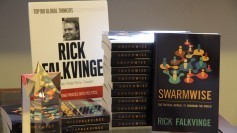Rick Falkvinge's Blog, page 18
November 17, 2013
NSA Asked Linus Torvalds To Install Backdoors Into GNU/Linux

Infopolicy – Christian Engström: The NSA has asked Linus Torvalds to inject covert backdoors into the free and open operating system GNU/Linux. This was revealed in this week’s hearing on mass surveillance in the European Parliament. Chalk another one up of the United States NSA trying to make information technology less secure for everyone.
The father of Linus Torvalds, Nils Torvalds, is a Member of the European Parliament for Finland. This week, Nils Torvalds took part in the European Parliament’s hearing on the ongoing mass surveillance, and brought a revelation:
The United States security service NSA has contacted Linus Torvalds with a request to add backdoors into the free and open operating system GNU/Linux.
The entire inquiry is available here on YouTube (uploaded by Hax).
Nils Torvalds’ revelation was presented in an episode which started (at 3:06:58) by me pointing out to the Microsoft representative in the panel, that in a system like GNU/Linux, built on open source, you can examine the source code to see that there aren’t any back doors. In Microsoft’s systems, this possibility is absent, since the source code is secret to outsiders.
My question to the Microsoft representative was whether she’d be allowed to disclose if there are deliberate back doors in their systems, in the event that there are. She never responded to that question, but obviously, she didn’t have to. From other sources, we know that the NSA always prohibits the private companies they force into cooperation from disclosing any of it.
Nils Torvalds spoke after me, and starting at 3:09:06, he said,
When my oldest son [Linus Torvalds] was asked the same question: “Has he been approached by the NSA about backdoors?” he said “No”, but at the same time he nodded. Then he was sort of in the legal free. He had given the right answer, [but] everybody understood that the NSA had approached him.
The story does not tell us how Linus Torvalds responded to the NSA, but I’m guessing he told them he wouldn’t be able to inject backdoors even if he wanted to, since the source code is open, and all changes to it are reviewed by many independent people. After all, that’s the whole point of open source code, and the reason that open source is the only kind you can trust when it comes to security.
Still, it’s very interesting to hear confirmation that the NSA has tried to attack Linux at its lead developer, too.

November 11, 2013
“Free” Does Not Mean “Exempt From Criticism”

Freedom of Speech – Zacqary Adam Green: “What is everyone complaining about? This is a free service, and [large corporation] can do whatever they want with it!” That’s true. Also wrong. Please stop saying it.
There’s always outrage whenever a popular online service like YouTube, Google, Facebook, Twitter, Tumblr, Flickr, or Whatevr makes some kind of unpopular change, or when unscrupulous business practices come to light. And in return, there’s always outrage at the outrage. “The service is free,” they say, “and it’s owned by a private company. Go use something else if you don’t like it.”
This is usually code for “I disagree with your complaint, and I get insecure and anxious when people have opinions that aren’t mine, because it reminds me of how alone I am in the universe. Therefore I am lashing out rather than attempting to explore my capacity for empathy.” It’s also a pretty weak argument.
On the one hand, yes: private companies can do whatever they want with their websites, and nobody can stop them. On the other hand, free speech allows people to be assholes, and say asshole things like, “This is a free service, and the parent company can do whatever they want with it,” and nobody can stop them. But we can sure try to stop them by criticizing the hell out of it.
This is how freedom works. It means nobody can kill you, imprison you, or fine you for doing whatever you want; not that nobody can yell at you. You are perfectly free to be an asshole. I am free to tell you you’re being an asshole. Then, you’re free to stop being an asshole. Or not. Or you could keep being an asshole. But if you did that, you’d be such an asshole.
That’s the crux of the issue. If you’re interested in exploring your capacity for empathy, here are a few reasons why it might be okay for people to complain about a free service.
“Go use something else if you don’t like it,” reminds me of, “If you don’t like ‘merica, you can get out!” Like, have you seen Canadian visa requirements? It’s not that easy. Switching away from a free service is a lot easier than emigration, but with the amount of lock-in and monopolization going on in the tech industry, it’s still often a challenge. Other services might not integrate with your OS or your other services the way that a badly-behaving market leader does.
Social networks make this even worse: if nobody else is using an alternative, then you’re effectively cutting yourself off from the rest of the world. In this day and age, Facebook, for example, has come to define the way billions of people communicate every day; it’s nearly impossible to switch away from. If Facebook were an open-air plaza in a city, the government would have reasonable cause to invoke eminent domain and seize it for the public. When something privately-owned grows big enough, and starts to affect enough people’s lives, it’s no longer okay for the private owner to do “whatever they want.” The public has become a stakeholder.
This is also true, by the way, for smaller niche networks besides Facebook, Twitter, YouTube, etc. Size doesn’t always matter relative to the whole world; impact on a community is what matters.
If you, a private individual or company, aren’t prepared to hear your users’ concerns and deal with them, then please don’t start an online service, and especially not a social network. Even if only 10% of people are upset about something, they still matter. “You can’t please everybody” isn’t an excuse when you’re running something as infinitely personalizable as a web service. You still can’t please everybody, but you can come pretty close if you care enough.
If those last four paragraphs don’t do anything for you, that’s fine. You’re not required to agree with anything. But please just stop trying to shut down or dismiss criticism of anything just because it’s “free,” and because people “don’t have to” see it or use it. If their complaints are ridiculous, go right ahead and point that out, but if you try to deny someone’s inalienable right to complain, you’re kind of being an asshole. So don’t do it anymore.
DISCLAIMER
Freedom of speech dictates that you are not in any way, shape, or form required to comply with the request not to be an asshole anymore. Just in case you’re one of those assholes who constantly needs to be reminded of that. Asshole.

November 6, 2013
Bitcoin’s Real Revolution Isn’t Hard Money, It’s Economic Panarchy

Diversity – Zacqary Adam Green: The earth-shattering thing about bitcoin isn’t its fixed money supply. It’s not the carefully tuned algorithm that keeps its growth at a steady rate, or the inability of a political body to play with its value. What’s new and government-toppling about bitcoin is that it’s a framework for starting a new economy.
Gold and silver have coexisted with governments and nation-states for thousands of years. If the economic properties of bitcoin — its finite supply — were inherently state-smashing, we’d be living in a very different world before the computer were even invented. No, bitcoin’s revolution isn’t what the Bitcoin Foundation calls its “non-political economy.”
In fact, you could argue that “non-political economy” is an oxymoron. If we define “political” as only referring to the workings of a state, then sure, you can have a non-political economy. But in the colloquial way that people often talk about “politics” — the “internal politics” of a workplace or social club, for example — there’s no such thing as a non-political economy. Any kind of money — whether it’s gold, dollars, bitcoin, or licking things to claim them as your own — only has any value if everyone in the economy agrees that it does.
What about supply and demand?
You could say that this observation doesn’t challenge the neoclassical economic theory of money very much at all. For example, bitcoin has value because there’s a demand for it, plus it’s in short supply. This is like saying that general relativity is consistent with the Genesis story, because the Earth could have been created in six “relative” days. It’s not technically wrong, just not a very helpful way of looking at the world.
I like the way David Graeber puts it in Debt:
[Money] is not a “thing” at all. You can no more touch a dollar or a deutschmark than you can touch an hour or a cubic centimeter. Units of currency are merely abstract units of measurement…If money is just a yardstick, what then does it measure? The answer [is] simple: debt. A coin is, effectively, an IOU.
Brett Scott expands on this:
Perhaps we can tinker with the word ‘money’ itself. It’s a mass noun, like you’d use for some kind of tangible substance, and it makes money sound like a ‘thing-in-itself’. As a kind of mental discipline, I prefer to use a different word: COGAS. It stands for ‘claims on goods and services’, which is all money really is.
So money is just a way of measuring who owes what: you give me something or do something for me, and now I owe you something equally valuable in return. That’s a social relation. And if a big group of people get together to agree on how their social relations should work, it suddenly starts to look political. Even the decision to use bitcoin requires the initial political decision to not screw with its politics in the future.
But wait just a minute. You see what just happened? A group of people decided that instead of using a national currency, with properties they don’t like and can’t control, decided to instead use bitcoin. That’s your revolution.
Bitcoin’s real contribution to the world is its source code. The blockchain, the network protocol, the cryptographic verification — anyone can take this and build a currency with any economic properties their community needs. I’m not convinced that bitcoin’s Austrian School properties can sustain a global (or even local) economy, but you know what? That’s okay. If I ever feel the bitcoin economy has become too unequal, unbalanced, or stagnant, it’s now trivial for me to start my own damn currency.
A single bitcoin belongs is a measurement like a centimeter, but the bitcoin community is a social network. People use bitcoin because other people they trade with use bitcoin. If my town is running low on bitcoin but has a lot of resources to share internally, we can create our own local currency to free up bitcoin for importing and exporting. Or I could join an online network of artists who work on one another’s projects, and we’d create our own internal currency that plays by whatever rules we need it to.
There is no perfect monetary system for every situation. Bitcoin is not going to be the one world currency, and it doesn’t need to be. A lot of people compare Bitcoin to the Internet, but it’s more like CompuServe. It’s the first of many digital, non-state currencies to come, that will all interoperate with each other in ways we can’t even dream of yet.
More on currency diversity
Definitely read the whole Brett Scott article quoted above. It’s a great piece on the nature of money, and what inventing a bunch of different currencies could mean.

November 5, 2013
Remember, Remember…

Civil Liberties: “…and all he demanded in return was your silent, obedient consent.” On this Fifth of November, the address from V is more accurate and relevant than ever:
…so let’s take a moment to reflect on the fact that liberty and freedoms of speech and expression are more than words; they are perspectives.

November 4, 2013
Vote Christian For The Pirate Party EU Ballot – Here’s Why

Pirate Parties: For once, an internal Pirate Party matter: if you’re a member of the Swedish Pirate Party and want to see me keep doing what I do, there’s something you need to do today (or November 6 at the latest). You need to vote for Christian Engström for the top position of the Pirate Party’s Europarl ballot. The reason is simple: between him and the other candidate for the ballot’s top position, Christian is the only one funding my keynoting and evangelizing. So if you want me to keep doing what I do, you need to vote, and you need to vote for Christian at the top.
Hi – today I have an internal matter for all people who are members of the Swedish Pirate Party and who appreciate my worldwide evangelizing.
The Swedish Pirate Party has two excellent candidates for the top spot on the EU ballot for next year’s European elections: Christian Engström and Amelia Andersdotter. They are quite different as individuals, and both have strong points. However, only one of them funds my keynoting, writing, and evangelizing that gives ripples worlwide, and that’s Christian Engström. So all else being equal, if you appreciate what I do and want me to continue doing so, you need to vote for the ballot proposals topped by Christian Engström.
The takeaway is straightforward: If you want me to keep spending all my energy traveling and talking about the pirate ideas and ideals in a way that is exceptionally rewarded and recognized (“Top Global Thinker”, “100 Most Influential People”, etc.), you need to vote for a ballot where Christian tops the Pirate Party Europarl ballot above Amelia, in anticipation of the quite real possibility that we only keep one of our two seats in the European Parliament in next year’s European elections. And you need to vote in the internal elections, today and possibly (but not necessarily) up to twice more.
If you’ve voted in an internal election before, it takes two minutes tops to place your four necessary votes. (If you haven’t voted before and need to register, it may take some five to ten minutes.) You need to go to this page, where there are four different cup-style elimination votes going on. In each of those elimination votes, a proposed ballot with Christian at the top is facing off against another ballot. You need to mark each of the four lists that is topped by Christian and vote for it, that is, the lists marked C01-Y04, C01-Y03, C01-Y06, and C01-Y01. Don’t forget to press “Vote” (rösta) after you’ve marked each ballot topped by Christian.
This takes two minutes or your time, and is your cost of making certain I’ll keep evangelizing freedoms of speech, expression, opinion, and the press for the next five years too. (Obviously, it assumes that the party also gets at least one seat, but that’s the next battle to fight.)
If you haven’t voted in Swedish Pirate Party meetings before, Christian’s blog has more elaborate instructions.

November 1, 2013
Swarmwise – The Tactical Manual To Changing The World. Chapter Ten.

Swarm Management: In many ways, success can be harder to handle than failure, because it sets expectations most people have never felt. These are some of the most important experiences on how to not make a wild success crash on its maiden flight into a painful failure.
Swarmwise chapters – one chapter per month
1. Understanding The Swarm
2. Launching Your Swarm
3. Getting Your Swarm Organized: Herding Cats
4. Control The Vision, But Never The Message
5. Keep Everybody’s Eyes On Target, And Paint It Red Daily
6. Screw Democracy, We’re On A Mission From God
7. Surviving Growth Unlike Anything The MBAs Have Seen
8. Using Social Dynamics To Their Potential
9. Managing Oldmedia
10. Beyond Success (this chapter)
The whole book is available for purchase from Amazon (US, UK) or for download as PDF.
As your swarm starts to rise to prominence and success, you personally will invariably do so, too. This was probably never a goal of the swarm as such, but it is the way oldmedia’s logic works — they need a face to associate with every movement or organization, and if the movement is successful, so is that particular face.
The danger lies in not realizing that people will regard everything you say as having much more weight than you place on it yourself at the time you say it. If your swarm is political, anything you do — or don’t do — will be interpreted as a political statement, everything from your choice of groceries to your pick of vacation resort. Anything you say will be interpreted as a suggestion for legislation. This translates into any other type of swarm, too — the effect doesn’t limit itself to political swarms.
To take an example, you could easily see somebody mildly drunk in a sports bar, a half-empty glass of beer in hand, shouting angrily at the football game on screen, and muttering, “What this game needs is a bullet to the referee’s head” under his breath to himself. Nobody takes such a statement literally, because of the situation it was uttered in and the person it was uttered by.
Now, imagine the exact same sentence uttered by the prime minister or president in the same bar and situation, but with reporters nearby — or for that matter, anybody with a blog nearby. It would take literally minutes before an oppositional blogger had an article out about how the prime minister wants to reinstate a barbaric death penalty for unsuitable sports professionals, and “has been overheard planning to introduce a bill about it in the near future.” Cue the inevitable shitstorm.
This is the situation you’ll find yourself in quite rapidly as your swarm starts to gain attention and success, and it will place great demands on you to start saying only what you really mean. While we tend to think we already do this, we say many things in closed company that are understood in the context of that company to not be meant literally. Those get-out-free cards are gone once you’ve been on the news a couple of times. Reporters and other people will start asking, “Did you really mean that?” and you will respond with a confused “But wait, I didn’t mean it that way” and immediately risk coming across as a backpedaling second-rate politician on the evening news. You want to avoid this.
The simplest way to avoid it is to be nice to all people, even to your adversaries. Doing so will not just benefit the culture of the swarm, where you lead by example and show people that being excellent to each other is the way to behave, but it will also catch your adversaries completely off guard. This is a good thing: “If you can’t convince them, confuse them.” You don’t have to agree with them — you just have to disagree nicely and politely.
THE DAY AFTER SUCCESS
In the entertainment business, they say that no time is as tough as the year after that year when you were the hottest thing of the town. This applies to every swarm as well. When we’ve been on a slowly upward trajectory for a couple of years, we tend to believe that any dings — any level-ups — are permanent ascensions to a new base level of popularity, acceptance, and visibility.
That is an illusion. Moreover, it is an illusion everybody in the swarm gets afflicted by, from the founder down to the individual activist.
Everybody in society is constantly fighting for visibility. Getting visibility is hard. Keeping it is even harder, for other people will seek to take it for their own causes.
The problems arrive when everybody in the swarm takes for granted that the current popularity, visibility, sales, or whatever your measure of success is will keep on for the next year or two. When that happens, they will stop working extrovertedly, and start fighting between themselves for all the riches and resources and fame that they see coming the swarm’s way on the expected continued success: everything from lavish jobs to expensive toys to personal visibility. As an inevitable result, the swarm’s success will collapse in months — and it won’t be a temporary glitch, it will be a deep structural problem based on faulty expectations of individual reward that takes time and effort to repair.
As the founder, it is your job to explain that when things appear to be at their peak, all those lavish jobs and expensive toys are farther away than ever. At that point in time, the swarm has two of its toughest challenges ever to overcome — to remain steadfast on the extroverted track, despite the distracting glimmering riches on the horizon, and the fact that the visibility and success will fade even if the swarm continues exactly on its current course of action, and this can be a very tough thing to face emotionally.
The Swedish and German Pirate Parties both fell for this predictable but treacherous mechanism. When the Swedish Pirate Party gained two seats in the European Parliament in 2009, with 7 percent of the votes, everybody felt that the parliamentary elections of the next year were practically a done deal. In reality, the race for those elections had only just started, and when people started forming factions for resources to mark their stake in how all the riches would be divided, the race was already lost. The German Pirate Party was the shooting star of 2011, winning a sensational 9 percent in the Berlin elections, and quickly climbing to 13 percent in the national polls, enough for a full eighty seats in Parliament (out of 622). At this point, unless actively countered, people will start seeing inevitable money and resources everywhere, and will start fighting for the five-hundred-or-so jobs that would be the outcome of such an election result. As of today’s writing one year later, the German Piratenpartei is polling at 3 percent, below the 5 percent parliamentary threshold for entry, with about nine months to go until the election.
This type of downfall is reversible and repairable, but it takes time and a lot of organizational and personal anguish to do so. Basically, once this downward spiral has set in, the swarm needs to bottom out at a failing level before people realize there aren’t any riches, at which point the repairs can start. This is painful for everybody involved. So keep the swarm on track, and do remind them of that saying in the entertainment business: no time is as tough as the year after the year you’re hot — and that year will come around, as certainly as the calendar tells you it will.
GOING INTERNATIONAL
If your swarm’s goals are of an international nature, you will very quickly see copycat movements in other countries, as activists there realize that your recipe for changing the world would work in their country, too. The Pirate Party has spread organically to seventy countries as of this writing, founded by me as an individual person on January 1, 2006.
There are basically three ways to handle an internationalization. The first is to ignore the people you inspire altogether, leaving them to their own devices, which is a bad idea from all conceivable angles. The second, better way is to lend as much energy and resources as you can to the international copycat movements without sacrificing the operational capability of your own swarm: provide the software you have already developed, experiences you’ve drawn, logotypes and press materials, and so on. Before long, experiences and promotional materials will start flowing in both directions as the swarms in other countries mature.
The third way is to aspire to lead all countries’ movements, just as you led the first country. It is likely that people in the new countries will agree to this, but it presents considerable cultural challenges.
Just because you understand a language, that doesn’t mean you understand what people are trying to say.
To give two examples, when I was working for a company based in the United States, I casually said “good luck” to an American manager who was heading off to negotiations. To somebody in Sweden, this is a friendly, casual expression on par with “godspeed” or “best of winds.” To somebody coming from a proper United States context, however, it has a distinct undertone of “because you’re going to need it” that I was completely unaware of when saying it. The careful translation of words isn’t enough to understand what you’re actually saying — or rather, what the person you’re talking to is hearing.
The second example is when I was in Brazil, and after a day of meetings, the crowd agreed to meet at 9:00 p.m. at a certain bar. Coming from northern Europe, to me, that statement means that you step through the door of that bar at 8:58 or 8:59 p.m., take thirty to forty-five seconds to locate your colleagues in the bar, and join them with some fifteen to thirty seconds to spare before the second hand on the watch passes the full hour of 9:00 p.m.
I had a feeling it didn’t mean the same thing in Brazil, and I’ve learned it’s better to ask once too often, so I asked, “So…9:00. Does that mean, like, 10:00?” Everybody laughed at my question, except for one person in the group who had grown up in the United States and moved to Brazil at an adult age. With his background, he understood that my question was actually serious. “Yes, Rick,” he said as laughter subsided, “about 10:00. Or maybe 11:00.” To the Brazilians, saying “9:00″ was just an arbitrary number for meeting some time in the evening — my counterquestion of “10:00″ made absolutely no sense to them, as 10:00 was as arbitrary and meaningless a number as “9:00″ had been.
These are just examples of everyday misunderstandings that will happen when you try to lead across cultures. Those nuances don’t come with learning a language, but you need to understand them in order to lead effectively. I would argue that it’s superhuman to understand more than two or three cultures to the depth necessary for leading a swarm in that culture, as a swarm is very informal by its nature.
If you do insist on leading all countries formally, I would argue that you need one or two people in every country to act as your local deputies, and that you spend a lot of time understanding the cultural differences in resolving any actions and paths ahead. Your preconceptions will be a mismatch for other cultures, and you won’t even be aware of the differences unless you take active steps to identify them.
At some point, an international support group will form by itself with the self-appointed task of coordinating the international versions of your swarm between countries, languages and cultures. At that point, it will be up to you whether you decide to step up and try to lead the international efforts, or keep leading your national swarm. I would recommend that you stay and lead your national swarm for at least as long as it takes to have its first major success.
I led the Swedish Pirate Party for its first five years, putting two people in the European Parliament on June 7, 2009, which sent political shockwaves around the entire world. After that success, the proof of concept was there, and there was a success blueprint in place. That was the major success necessary. After that, there was no further doubt in the world that this could actually be pulled off.
DON’T SHOOT FOR THE MOON
In closing, it is possible for one person to set out to change the world and succeed. Other people hold no genetic advantage over you — there is nothing inherent to say that their position is superior to yours and that you can’t succeed. Quite to the contrary, it is much a matter of attitude.
No matter whether you believe that you can or cannot change the world, you are probably correct.
There is nothing taking place within the laws of physics that you cannot accomplish. Don’t shoot for the moon in changing the world — that has already been done by somebody else. Shoot for Mars! Build a Mars colony. That’s perfectly doable by somebody determined who builds a swarm to support the initiative.
Just like with any idea to change the world, if you approach it like a project, you can execute it like a project. “Let’s see. We need two dozen volunteer rocket scientists, maybe a dozen metallurgists, a couple of people crazy enough to mix rocket fuel in their back yard….” When you know what it takes to get from A to B, the rest is just execution and inspiration. Therefore, the first step is to tell the world that you’re going to go from A to B, and say what you think it takes to do so, as we saw in chapter 2. A hurdle is never impossible once you know exactly what it looks like — only when you fear its height because you’ve never taken the effort to find out how difficult it actually is to climb.
Of course, your initial estimates of what it takes may be off the mark. They may not even be in the correct ballpark. But in order to discover that, you must put a stake in the ground and start executing the project, and work by trial and error. As we’ve seen, iteration speed is key. Try, improve, adapt, try again. Iterate, iterate, iterate. You will likely be surprised yourself at how quickly plans materialize and self-adjust once you get expertise from various fields involved in the project.
The Swedish Pirate Party set out to go from nothing to getting elected in eight months. We discovered many hurdles along the way, and assessed and passed them just as quickly, working as a swarm where anybody could contribute expertise freely. While we were disappointed with our first election result of 0.6 percent, everybody else was very impressed and had never expected that. The following election brought us into the European Parliament, so “getting elected” became a project executed at one-half of the time of the previous major political movement and at less than 1 percent of the cost of the competition.
The laws of physics are your only limit. (Unless you’re a theoretical physicist, in which case not even those laws may be a hard barrier.)
You want to teach two billion people how to read and write, ending illiteracy in the world? Completely doable.
You want to provide artificial light and heating to a billion people in developing countries? Or clean water? A swarm can make it happen.
How about teaching five billion people rational thinking and scientific approach, in an attempt to end religious conflicts? Totally within grasp.
Don’t shoot for the moon. Shoot for Mars!
FINAL WORDS
In my worldwide presentations, I describe how everybody can change the world if he or she is passionate about a specific change, and that change is tangible, credible, inclusive, and epic enough to attract a swarm.
Whether your dream is to end illiteracy and teach two billion people to read, or you want to take humanity to Mars, the principles are the same.
Change doesn’t just happen, I say.
Somebody always makes it happen.
The final words of this book will therefore be the same words that close my presentations and workshops about cost efficiency in management and volunteer activism:
Do you want to be that person?
(This article is part of the final edit of the book manuscript. It is Creative Commons, CC-BY-NC.)
EXCERPT FROM PUBLISHED BOOK

This is a part of the book Swarmwise, available for purchase from Amazon (US, UK) or for download as PDF. It is an instruction manual for recruiting and leading tens of thousands of activists on a mission to change the world for the better, without having access to money, resources, or fame. The book is based on Falkvinge’s experiences in leading the Swedish Pirate Party into the European Parliament, starting from nothing, and covers all aspects of leading a swarm of activists into mainstream success.

October 30, 2013
So Was Angela Merkel A Terrorist Or A Pedophile?

Civil Liberties: The news that Angela Merkel’s phone has been wiretapped by the USA exposes the biggest wiretapping lie ever – that mass surveillance is targeted at catching terrorists and pedophiles. The German Chancellor is rightfully furious, and she should be furious on behalf of her citizens, too. Mass surveillance was never about terrorists or pedophiles: it is a tool of pure and raw domination.
With the exposure of German Chancellor Merkel’s phone being wiretapped by the US surveillance agencies, the mass surveillance has received yet another spotlight. This is welcome as it intensifies the discussion on civil liberties and the freedoms of speech, assembly, opinion, and the press – and how these freedoms need to carry over into the online environment.
To some extent, it is sad that it takes a personal insult against a leading politicians for something as grave as a threat to democracy itself to come to light, but still, here we are. The mass surveillance has been rolled out en masse without much protest, due to leading politicians smoothing over any worries by using worse scarewords, a common tactic.
We have frequently and repeatably been told that mass surveillance and wiretapping is necessary to “catch terrorists”. Pedophiles are also mentioned from time to time. This is a complete and utter lie.
In that context, it is also said that the mass surveillance, sweeping across all citizens, is necessary to find the needles in the haystack. You may be wiretapped so that governments can find the somebody-else terrorist, and you’re just randomly caught in the dragnet, we’re falsely told.
However, we also have news that Barack Obama personally approved the wiretapping of Angela Merkel. This means that there wasn’t a random element involved; she was directly, personally, and individually targeted.
This begs the inevitable question: Was Angela Merkel considered a terrorist or a pedophile? It has to be either one, given the justifications we’ve heard for wiretapping. So which one was it?
The obvious answer, now that we have the information, is neither – because the surveillance was not intended to catch neither terrorists nor pedophiles. It was just a lie, a big bold lie, a big oft-repeated lie.
The purpose of wiretapping was always domination. Geopolitical domination over other countries; governmental domination over citizens. Pushing down people into their shoes; kicking away the ladder when you’ve climbed to the top. Whoever holds the information advantage dominates other people.
Do note that Chancellor Merkel is only upset that her own phone has been wiretapped. She has not expressed outrage at the 82 million other Germans or the 500 million other Europeans that share her fate. Unless we keep talking about civil liberties, politicians will stop wiretapping each other and concentrate on governmental mass wiretapping of citizens. That’s nowhere near okay, either.
If you are being wiretapped, and you are, it is because somebody desires to dominate you.
(See also the article that tells how we know with 100% certainty that the mass surveillance never caught a single terrorist plot. No wonder: that’s not why it’s there.)

October 25, 2013
In Mass Surveillance Fallout, European Parliament Votes To Suspend Financial Data Sharing With United States

Privacy: This week, the European Parliament voted to immediately suspend the sharing of European financial tracking data with the United States in a 280-254 decision, as well as calling for criminal investigations of the NSA. This follows in the footsteps of mass surveillance revelations that the NSA has illegally hacked into the SWIFT financial data. This appears to be yet another public wake-up and backlash against the secretive wiretapping industry.
The European Parliament has voted to immediately suspend the SWIFT data-sharing program with the United States. This follows on revelations that the NSA has hacked into the SWIFT system, which manages European and global financial transactions, and illegally given themselves access to the entire system. The European Parliament considers this to be so thorough and brutal a breach of trust, that the data-sharing agreement is called to be revoked immediately.
Under the so-called SWIFT data-sharing agreement, European financial transactions are sent to the United States in bulk, in a joint attempt to combat terrorism in the Terrorist Finance Tracking System (TFTS). Critics of the program have pointed out that it is a privacy violation of European citizens, as well as a naïve way of giving U.S. industries the upper hand in business negotiations by giving them an information advantage.
The European Parliament instructs the police of the European states to begin criminal investigations into the NSA’s dealings:
(from the Europarl report)
10. Asks the Council and the Member States, in the light of the above, to authorize an investigation by the Europol Cybercrime Centre into the allegations of unauthorized access to financial payment data governed by the Agreement;
11. Calls on the special inquiry by the Committee on Civil Liberties, Justice and Home Affairs into the mass surveillance of EU citizens to further investigate the allegations of unlawful access to financial payment messages covered by the Agreement;
The SWIFT data-sharing agreement was championed by European Commissioner Cecilia Malmström, who first negotiated it while sitting on a different chair, and then championed it from the Commission once having been appointed European Commissioner, insisting that the European Parliament must approve it. She has bet a lot of her career on this data-sharing, and the European Parliament’s vote this week is not just a blow to the credibility and trustability of the United States, but also to her personal political career.
It remains to be seen if Commissioner Malmström intends to defy the European Parliament by refusing to suspend the data sharing. It also remains to be seen if a revocation of voluntary data sharing has any practical effect, seeing how the NSA has illegally given itself access to the data anyway.

We Know With 100% Certainty That Mass Surveillance Hasn’t Foiled A Single Terror Plot

Privacy: We know with 100% absolute certainty that the wiretapping industry – NSA, GCHQ, FRA, etc – has stopped a total of exactly zero terror plots. We can be certain of this fact, as there have been no trials and no convictions of planning widespread destruction. Planning such a crime is almost as serious a crime as executing it, and while there can be secret evidence in some uncivilized countries, the courts and trials themselves are not secret.
In an attempt to justify their existence, the NSA, the GCHQ, the FRA, and other similar governmental agencies in the wiretapping industry tend to say that their existence and actually-criminal operations are justified by the fact that they “foil terror plots” – a textbook example of how the ends justify the means, and of the necessity of upholding the law by systematically breaking it.
We have heard this justification from the NSA, the GCHQ, and the FRA alike, just like from their brethren. However, we know for a certainty that they are lying.
If an act of terror was being planned in some stage sufficienty advanced to talk of it in terms of a “terror plan”, then such planning and preparation is itself a crime. In Sweden, the principal crime is “causing devastation with a hazard to the public” (allmänfarlig ödeläggelse), and that is a crime that carries a prison sentence in the double digits or even life in prison. Planning and preparing for such a crime (“förberedelsebrott”) carries practically as high a sentence as carrying it out.
So if such a planning had actually been discovered, it would be in the courts, and somebody would be on trial for it. That sequence of events is absolutely inescapable. We don’t have secret courts (even if some uncivilized countries insist of having secret evidence); the trials and charges are public, so that the public can hold the judicial branch to proper account under transparency.
But no such charges have been filed, and no such trials have been held, and most importantly, there have been no convictions. It is absolutely and positively unthinkable, that if a terror plot was foiled, that no charges would be filed. If somebody had been discovered to prepare for “devastation with a hazard to the public”, that would mean a very serious crime had been committed with penalties including the harshest possible sentence – life in prison – and such criminals would have been brought to justice exactly 100% of the time, resulting in convictions if there were a “terror plot”.
Seeing how this has not happened, we can be absolutely certain that the wiretapping industry has stopped a total of exactly zero so-called “terror plots”.
In other words, when the governmental agencies of the wiretapping industry are mumbling about having stopped “fifty or so plots but we can’t tell you about them”, they are using a well-established political persuasion method called lying like a fucking weasel.

October 24, 2013
Tintin And The Copyright Sharks

Copyright Monopoly – Lionel Dricot: Tintin, the well-known cartoon adventurous reporter, is something that the creator Hergé wanted to die with him. In this guest piece, Lionel Dricot explains how a British man managed to crush Hergé’s legacy and turn the whole thing into profitable exploitation that is purely hostile to all things artistry, intending to never let the cartoon fall into the public domain, not even in 2053.
In Belgium, Tintin is an icon. Something that the whole country is proud of. Beers, chocolates and Tintin are the symbols of that small European country.
Tintin was created by the cartoonist Hergé, who died in 1983 while working on the 24th album of Tintin, which was never finished and was only published as an incomplete story in 2004.
Before dying, Hergé explicitly stated that nobody should continue Tintin. He wanted his young reporter to die with him and, so far, his will has been respected. Old albums are regularly reprinted and most Belgians have read the 22 albums of the series at least once (the very first one, Tintin and the Soviets, is actually a pretty odd anti-communist propaganda from the 50s and Hergé didn’t want to republish it). Unlike other cartoon characters, Tintin is not evolving any more but the richness of the 22 albums, with their parade of magnificent characters, is considered a sacred work by the so-called Tintinophiles.
All of that didn’t prevent a very lucrative business to happen: derivatives, cookies and even a movie directed by Steven Spielberg himself. Each time a picture of Tintin is used somewhere in the world, the company Moulinsart (previously called Tintin Licensing, which is more explicit) earns a bunch of royalties. And guess what? They are pretty expensive.
The company even built a 15,000,000€ museum, called the Musée Hergé, which was built in the city of Louvain-la-Neuve on the location of the local youth club which has to be destroyed. During the inauguration, none of the journalists were allowed to take any picture to prevent “copyright abuse due to the work exposed”. Disgruntled, some journalists left the museum, which is very ironic when you know that Tintin is a reporter and a symbol of adventurous journalism. Today, the museum is mainly visited by international tourists and quite unpopular among the locals.
But what is this Moulinsart company that makes so much money? Who is becoming insanely rich thanks to the exploitation of Tintin? The answer is: a British man called Nick Rodwell. What was his contribution to Tintin? Essentially, he married Hergé’s widow. Yes, that’s all. He managed to transfer all the rights of Tintin to the company he founded with his wife and is now just trying to crush every use of Tintin where he doesn’t get enough royalties. Regularly, typical small Belgian snacks that use a picture of Tintin on their front window (because it’s a Belgian icon after all) are sued or shut down. Needless to say, Nick Rodwell is quite unpopular amongst Tintinophiles.
True fans wait for 2053. 70 years after Hergé’s dead, Tintin will become public domain. The symbol will become available to anyone.
Unless…
In a recent interview, Nick Rodwell announced that Moulinsart would do anything they could to prevent Tintin to become public domain after 2053. To “protect” it. And they have an idea: another Belgian cartoon icon in Belgium, Spirou, has always been owned by a company (Dupuis) and, as such, cannot become public domain as long as the company produces new related work. Nick Rodwell plans to do exactly the same by releasing a new album… in 2051! Despite Hergé’s will, they plan to “protect the work”. They still have no idea about the story.
Maybe we could help them. “Tintin and the Copyright Sharks” sounds like an appealing story. A story that could illustrate how copyright is protecting “the artists”, those who work so hard to entertain us.
PS: Ironically, today (October 24, 2013) it was announced in the Belgian news that due to its impopularity, the Museum Hergé is currently an economic failure. Although the Museum is entirely private (and any benefit would go to the Moulinsart company), Nick Rodwell asked for financial help from the government.

Rick Falkvinge's Blog
- Rick Falkvinge's profile
- 17 followers



